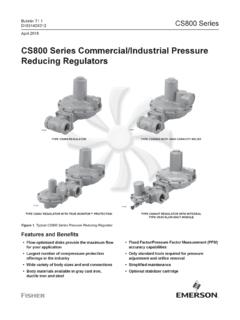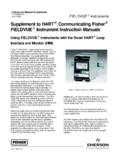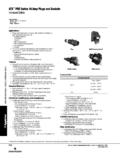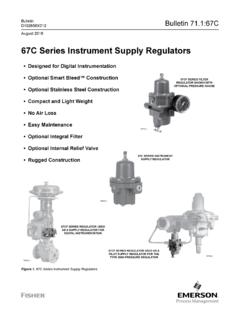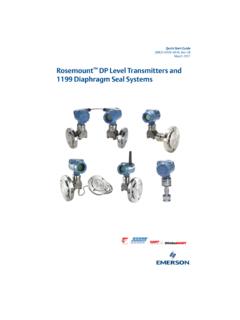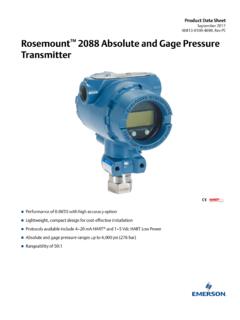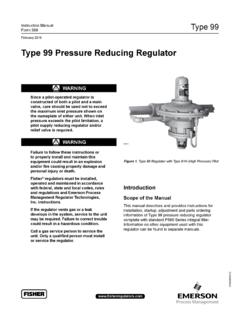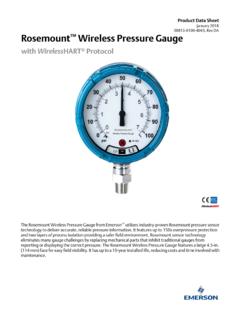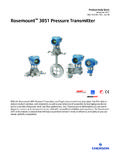Transcription of Fisher HPS-C and HPT-C Valves - Emerson Electric
1 HPS-C and HPT-C of Plug Soft Metal-to-Metal 1. Fisher HP-C Valve with 657 ActuatorX1367 IntroductionScope of ManualThis instruction manual includes installation, maintenance, and parts information for Fisher HPS-C and HPT-C to separate manuals for instructions covering the actuator and not install, operate, or maintain HPS-C or HPT-C series Valves without being fully trained and qualified in valve,actuator, and accessory installation, operation, and maintenance. To avoid personal injury or property damage, it isimportant to carefully read, understand, and follow all the contents of this manual, including all safety cautions andwarnings. If you have any questions about these instructions, contact your Emerson sales office or Local BusinessPartner before ManualD104208X012 HPS-C and HPT-C ValvesJuly 2017 Instruction ManualD104208X012 HPS-C and HPT-C ValvesJuly 20172 Table 1. SpecificationsValve SizesHPS C: NPS J 1 to 3 (CL900 and CL1500) and J 1 to2 ( CL2500) HPT-C : NPS J 4, and J 6 (CL900 and CL1500)End Connection Styles(1)CL900, 1500, and 2500 raised-face and ring type jointflanges per ASME weld end connection per ASME and PN250 flanges per EN1092-1 Maximum Inlet Pressure(1)CL900 and 1500 Valves are consistent withpressure temperature ratings per ASME Valves are consistent withpressure temperature ratings per ASME Classifications per ANSI/FCI 70 2 and IEC 60534 4 HPT-C and HPS-C : Metal Seat:J Class IV is standardJ Class V air test is optional (test will be at 50 PSIDair) (2)Material Temperature Capability(1)HPT C: -198 to 66_C (-325 to 150_F)HPS C: -198 to 316_C (-325 to 600_F)Cryogenic Leak TestClass C (optional)Maximum Actuator ThrustSee table 2 Flow CharacteristicsHPT C and HPS-C : Equal percentage, linear, and modified equal percentageFlow DirectionsHPT C.
2 Normally down for linear and equalpercentage trims. Flow up for Whisper TrimHPS C: Normally upApproximate WeightsHPS C:NPS 1: 47 kg (103 lb)NPS 2: 81 kg (179 lb)NPS 3: 147 kg (324 lb)HPT C:NPS 4: 271 kg (598 lb)NPS 6: 593 kg (1308 lb)1. Do not exceed the pressure/temperature limits in this manual and any applicable code Class V shutoff cannot be performed with water. This residual trapped moisture from testing with water can cause valve and trim damages from the ice crystals formed at below freezingservice has single-port, globe-style control valve with cage-guiding, unbalanced valve plug, and push-down-to-closevalve plug has single-port, globe-style control valve with cage guiding, balanced valve plug, and push-down-to-close valveplug Valves feature stainless steel construction materials and fabricated extension ServicesFor information on available courses for Fisher HPS-C and HPT-C Valves , as well as a variety of other products, contact: Emerson Automation SolutionsEducational Services - RegistrationPhone: 1-641-754-3771 or 1-800-338-8158E-mail: ManualD104208X012 HPS-C and HPT-C ValvesJuly 20173 SpecificationsTable 2.
3 Maximum Allowable Actuator Thrust for Standard Style 3 Bonnet Extension LengthVALVEVALVE SIZE, NPSSTEM DIAMETERMAXIMUM ALLOWABLE STEM LOADFOR S20910 STEM 1/413918531290 Installation WARNINGA lways wear protective gloves, clothing, and eyewear when performing any installation operations to avoid injury or equipment damage caused by sudden release of pressure may result if the valve assembly is installedwhere service conditions could exceed the limits given in table 1 or on the appropriate nameplates. To avoid such injury ordamage, provide a relief valve for over pressure protection as required by government or accepted industry codes andgood engineering with your process or safety engineer for any additional measures that must be taken to protect against processmedia. If installing into an existing application, also refer to the warning at the beginning of the Maintenance section in thisinstruction manual. WARNINGWhen ordered, the valve configuration and construction materials were selected to meet particular pressure, temperature,pressure drop, and controlled fluid conditions.
4 Because some valve body/trim material combinations are limited in theirpressure drop and temperature ranges, do not apply any other conditions to the valve without first contacting yourEmerson sales office or Local Business Partner. WARNINGSome bonnet flanges have a tapped hole that was used to handle the bonnet during manufacture. Do not use this tappedhole to lift the valve assembly or personal injury may Before installing the valve, inspect the valve and associated equipment for any damage and any foreign Make certain the valve body interior is clean, that pipelines are free of foreign material, and the valve is oriented sothat pipeline flow is in the same direction as the arrow on the side of the ManualD104208X012 HPS-C and HPT-C ValvesJuly 201743. Gas Service: The normal method of mounting for gas service is with the actuator vertical above the valve , the control valve assembly may be installed in any orientation unless limited by seismic criteria.
5 Otherpositions may result in uneven valve plug and cage wear that could result in improper operation. For mountingassistance, consult your Emerson sales office or Local Business avoid possible damage to the packing, do not allow the installed actuator angle to be so flat as to allow liquid inside thebonnet to come in contact with the , if insulation is applied, do not let the insulation run up the extension bonnet. This could cause the packing to freezeand be Service: The preferred method of mounting for liquid service is with the actuator vertical above the valve will allow a vapor layer to form between the liquid and the packing. If there are piping constraints, the actuatorcan be angled slightly from vertical. However, in no case should the angle be so flat as to allow liquid inside the bonnetto come in contact with the packing. For mounting assistance, consult your Emerson sales office or Local If insulation is applied, make sure it is applied only to the body/bonnet joint.
6 Do not let the insulation run up theextension Use accepted piping and welding practices when installing the valve in the line. For flanged valve bodies, use asuitable gasket between the valve body and pipeline If the actuator and valve are shipped separately, refer to the actuator mounting procedure in the appropriateactuator instruction If the valve body was shipped without packing installed in the packing box, install the packing before putting thevalve body into service. Refer to instructions given in the Packing Maintenance procedure. WARNINGP ersonal injury could result from packing leakage. Valve packing was tightened before shipment; however, the packingmight require some readjustment to meet specific service with ENVIRO SEAL live loaded packing will not require this initial readjustment. See the Fisher instructionmanual ENVIRO SEAL Packing System for Sliding Stem Valves (D101642X012) for packing instructions. If you wish toconvert your present packing arrangement to ENVIRO SEAL packing, refer to the retrofit kits listed in the parts kitsub section near the end of this ManualD104208X012 HPS-C and HPT-C ValvesJuly 20175 MaintenanceValve parts are subject to normal wear and must be inspected and replaced as necessary.
7 Inspection and maintenancefrequency depends on the severity of service conditions. This section includes instructions for packing maintenanceand trim maintenance. All maintenance operations may be performed with the valve in the line. WARNINGA void personal injury or property damage from sudden release of process pressure. Before performing any maintenanceoperations:D Do not remove the actuator from the valve while the valve is still Always wear protective gloves, clothing, and eyewear when performing any maintenance operations to avoid Disconnect any operating lines providing air pressure, Electric power, or a control signal to the actuator. Be sure theactuator cannot suddenly open or close the Use bypass Valves or completely shut off the process to isolate the valve from process pressure. Relieve process pressurefrom both sides of the valve. Drain the process media from both sides of the Vent the pneumatic actuator loading pressure and relieve any actuator spring Use lock out procedures to be sure that the above measures stay in effect while you work on the The valve packing box may contain process fluids that are pressurized, even when the valve has been removed from thepipeline.
8 Process fluids may spray out under pressure when removing the packing hardware or packing rings, or whenloosening the packing box pipe Check with your process or safety engineer for any additional measures that must be taken to protect against instructions carefully to avoid damaging the product surfaces, which could result in damage to the HPS-C / HPT-C Valves use spiral-wound gaskets which are crushed to provide their seal. A spiral-wound gasket should never bereused. Whenever a gasket seal is disturbed by removing or shifting parts, a new gasket should be installed upon reassembly. Thisis necessary to ensure a good gasket seal because the used gasket may not seal ManualD104208X012 HPS-C and HPT-C ValvesJuly 20176 Packing MaintenanceThis section covers PTFE V ring, double PTFE, and graphite packing used in extension bonnets (figure 2).NoteIf the valve has ENVIRO SEAL live loaded packing installed, refer to the instruction manual ENVIRO SEAL Packing System for SlidingStem Valves (D101642X012) for packing instructions.
9 Figure 3 shows typical ENVIRO SEAL packing key numbers are shown in figures 2. ENVIRO-SEAL packing key numbers are shown in figure and valve key numbers are shown in figures 4 and spring-loaded single PTFE V-ring packing, the spring (key 24) maintains a sealing force on the packing. If leakage isnoted around the packing follower (key 28), check to be sure the shoulder on the packing follower is touching thebonnet. If the shoulder is not touching the bonnet, tighten the packing flange nuts (key 20), until the shoulder isagainst the bonnet. If leakage cannot be stopped in this manner, proceed with replacing packing there is undesirable packing leakage with other than spring loaded packing, first try to limit the leakage andestablish a stem seal by tightening the packing flange the packing is relatively new and tight on the stem, and if tightening the packing flange nuts does not stop theleakage, it is possible that the valve stem is worn or nicked so that a seal cannot be made.
10 The surface finish of a newvalve stem is critical for making a good packing seal. If the leakage comes from the outside diameter of the packing, itis possible that the leakage is caused by nicks or scratches around the packing box wall. If performing any of thefollowing procedures, inspect the valve stem and packing box wall for nicks and scratches. If leakage continues,replace the packing by following the numbered steps presented in the replacing packing Packing RingsKey numbers referred to in this procedure are shown in figures 2, 4 and 5 unless otherwise using packing with a lantern ring (key 24) it may be possible to add packing rings above the lantern ring as atemporary measure without removing the actuator from the valve Isolate the control valve from the line pressure, release pressure from both sides of the valve body, and drain theprocess media from both sides of the valve. If using a power actuator, also shut off all pressure lines to the poweractuator, release all pressure from the actuator.
